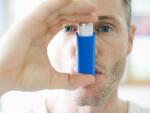Symptoms of nighttime asthma can include increasing shortness of breath, recurrent wheezing, and waking up with asthma symptoms.
This article explains sleep-related and nighttime asthma attacks, including their symptoms, causes, and triggers. It also discusses treatment and when to contact a doctor.

Nighttime asthma is a common presentation of asthma. Research suggests that it may affect 44–61% of people with asthma.
Symptoms of nighttime asthma may include:
- difficulty breathing
- shortness of breath
- wheezing
- coughing
- chest tightness or pressure
- chest pain
- waking from sleep with symptoms
- daytime tiredness or sleepiness
These asthma attacks or flare-ups
If you have nighttime asthma, your respiratory symptoms typically flare up at night or early in the morning.
“Nighttime asthma” can occur at other sleep times
If you have nighttime asthma, your respiratory symptoms typically flare up at night or early in the morning. However, some people may experience worse asthma symptoms any time they sleep, whenever that may be.
For example, people who work at night may sleep during the day. They may then experience sleep-related asthma flare-ups during the day rather than at night.
Contact your doctor as soon as possible if you notice gradual or mild worsening of symptoms. This includes more flare-ups at night or around sleep times. This may indicate that your asthma is not responding effectively to treatment.
Severe asthma attacks
- symptoms are severe, such as severe chest pain or difficulty breathing
- symptoms are not improving with quick-relief treatment
- you do not have access to your quick-relief treatment
Consult your asthma action plan while waiting for care.
Also, contact your doctor if you have concerns or questions about your asthma.
An asthmatic reaction or episode
Clinicians are not sure of the exact cause of nighttime or sleep-related asthma attacks. However, there are theories based on research.
A 2021 review suggests that the following factors may cause asthma to be worse at night or during sleep.
Circadian rhythm
Circadian rhythm is a 24-hour “internal clock” in the brain that
The body’s circadian rhythm may contribute to sleep-related asthma attacks in the following ways:
- Inflammation: The circadian rhythm can increase immune activity and may cause the release of various inflammatory cells. These cells may increase airway hypersensitivity and airway resistance at night.
- Hormone levels: The circadian rhythm may stimulate the production of melatonin and other hormones that can contribute to inflammation.
Environmental triggers
Exposure to certain environmental irritants may increase while you sleep or before sleep. If irritants are particularly triggering for you, you may experience worse asthma. Examples include bed sheets containing dust mites, or spending time in smoky areas before sleep.
Other
- other kinds of smoke, vapor, or fragrance
- cold air, or humid or dry air
- allergens, such as:
- animal dander
- pollen
- mold
- cockroaches
Obstructive sleep apnea
Obstructive sleep apnea (OSA) is a disorder that causes the upper airway to become obstructed temporarily during sleep. OSA may affect people with asthma more often than people without.
Symptoms include:
- abrupt awakening
- loud snoring
- severe sleepiness when awake
Treatment
Doctors can often treat OSA with special breathing or oral devices. If needed, your doctor may recommend surgery.
Gastroesophageal reflux disease
Gastroesophageal reflux disease (GERD) is when stomach acid flows backward from the stomach up to the esophagus.
Acid reflux and heartburn due to GERD may be worse in the evening or when lying down. GERD symptoms may affect the nerves of the esophagus, triggering asthma symptoms.
Treatment
Treatment for GERD can include medications such as:
- antacids
- H2 blockers
- proton pump inhibitors
Rhinitis and rhinosinusitis
Rhinitis and rhinosinusitis can both cause inflammation and swelling inside the nose. This leads to nasal pain and congestion.
People with chronic rhinosinusitis and asthma may be more likely to experience nighttime symptoms of asthma.
Also, rhinitis
Treatment
Your doctor may recommend:
- saline nose sprays
- antihistamine medications
- decongestants
Medications for asthma can help reduce inflammation or airway obstruction, and may
- inhaled corticosteroids
- oral corticosteroids
- long-acting beta-agonists
- leukotriene-modifying agents
Your doctor may also recommend lifestyle changes, such as quitting smoking or reducing exposure to triggers.
Learn more about medications and treatment for asthma.
For underlying conditions such as GERD or OSA, your doctor can also provide additional specific treatments.
You may not be able to prevent all asthma attacks. However, steps to improve asthma that is worse at night may include:
- sleeping in different positions to help improve breathing or reduce OSA or GERD
- following your doctor’s treatment advice, including for underlying conditions
- contacting your doctor if your treatment appears not to be effective, or if you have questions about it
- avoiding known triggers with actions such as:
- washing your sheets and cleaning your room regularly to reduce dust mites
- avoiding sleeping with pets if pet dander triggers your asthma
Nick Villalobos, M.D., has also reviewed the following frequently asked questions.
Can you die from an asthma attack in your sleep?
As with any severe asthma attack, asthma attacks during sleep can be life threatening. However, people may wake from sleep during an asthma attack, allowing them to seek treatment and reducing risks.
Does cortisol cause asthma to be worse at night?
Cortisol may cause asthma to be worse at night, in addition to other factors. The circadian rhythm that controls sleep cycles can affect cortisol levels, which, in turn, may contribute to airway obstruction. However, researchers are not yet completely sure about the causes of asthma that is worse at night.
Experiencing asthma that is worse at night or during sleep can be common. It is unclear why this happens, but the body’s circadian rhythm and conditions such as GERD may be involved.
If you are experiencing worsening symptoms of asthma, doctors may make changes to your treatment plan to improve its effectiveness.
Call 911 for asthma symptoms that are severe or not improving with quick-relief treatment. Also, contact your doctor with any questions or concerns.











